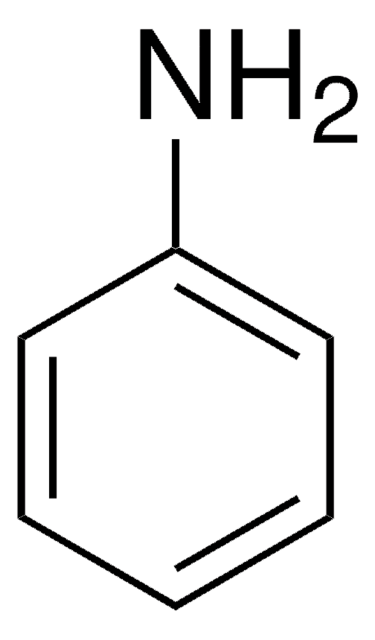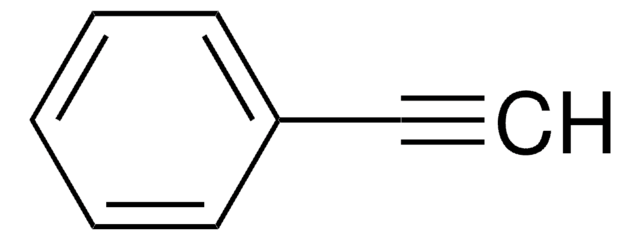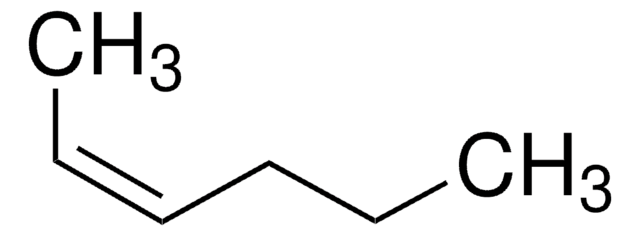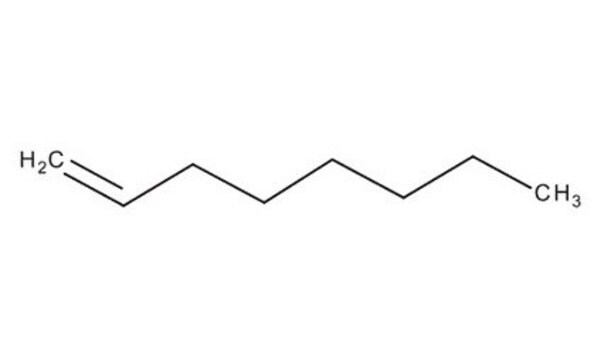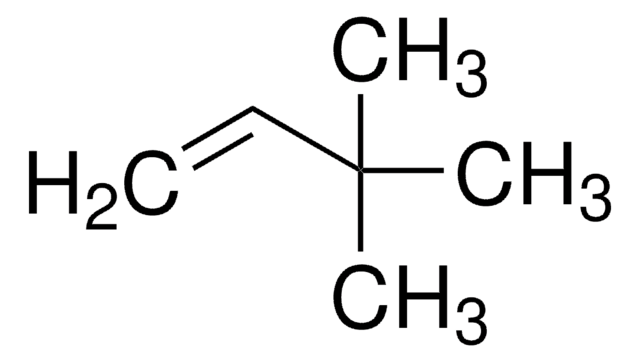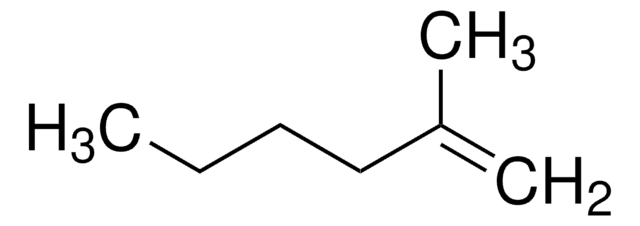All Photos(1)
About This Item
Linear Formula:
CH3(CH2)3CH=CH2
CAS Number:
Molecular Weight:
84.16
Beilstein:
1209240
EC Number:
MDL number:
UNSPSC Code:
12352100
PubChem Substance ID:
NACRES:
NA.22
Recommended Products
vapor density
3 (vs air)
Quality Level
vapor pressure
155 mmHg ( 21.1 °C)
Assay
97%
form
liquid
autoignition temp.
487 °F
refractive index
n20/D 1.388 (lit.)
bp
60-66 °C (lit.)
density
0.678 g/mL at 25 °C (lit.)
functional group
allyl
SMILES string
CCCCC=C
InChI
1S/C6H12/c1-3-5-6-4-2/h3H,1,4-6H2,2H3
InChI key
LIKMAJRDDDTEIG-UHFFFAOYSA-N
Looking for similar products? Visit Product Comparison Guide
Related Categories
Application
1-Hexene can be used:
- As a substrate for polymerization by various catalysts.
- To prepare good quality middle distillates and lubricating oils by oligomerization.
- In the synthesis of aldehydes using supercritical CO2 and rhodium catalyst by hydroformylation reaction.
Signal Word
Danger
Hazard Statements
Precautionary Statements
Hazard Classifications
Asp. Tox. 1 - Flam. Liq. 2
Supplementary Hazards
Storage Class Code
3 - Flammable liquids
WGK
WGK 2
Flash Point(F)
-13.0 °F - closed cup
Flash Point(C)
-25.0 °C - closed cup
Personal Protective Equipment
dust mask type N95 (US), Eyeshields, Gloves
Choose from one of the most recent versions:
Already Own This Product?
Find documentation for the products that you have recently purchased in the Document Library.
Customers Also Viewed
Oligomerization of 1-hexene and 1-octene over solid acid catalysts.
de Klerk A.
Industrial & Engineering Chemistry Research, 44(11), 3887-3893 (2005)
Hydroformylation of 1-hexene in supercritical carbon dioxide using a heterogeneous rhodium catalyst. 3. Evaluation of solvent effects.
Hemminger O, et al.
Green Chemistry, 4(5), 507-512 (2002)
Isospecific living polymerization of 1-hexene by a readily available nonmetallocene C 2-symmetrical zirconium catalyst.
Tshuva, Edit Y et al.
Journal of the American Chemical Society, 122(43), 10706-10707 (2000)
Stereospecific living Ziegler- Natta polymerization of 1-hexene.
Jayaratne, Kumudini C and Sita, Lawrence R
Journal of the American Chemical Society, 122(5), 958-959 (2000)
Chia-Hsiu Chen et al.
Journal of the American Chemical Society, 137(21), 6965-6971 (2015-05-12)
The stereochemistry, kinetics, and mechanism of olefin polymerization catalyzed by a set of zirconium-based metallocenes was studied by NMR using dissolution dynamic nuclear polarization (DNP). Hyperpolarized 1-hexene was polymerized in situ with a C2 symmetric catalyst, [(EBI)ZrMe][B(C6F5)4] (EBI = rac-(C2H4(1-indenyl)2))
Global Trade Item Number
| SKU | GTIN |
|---|---|
| 320323S-18L-RC | |
| 320323-1L | 4061826695814 |
Our team of scientists has experience in all areas of research including Life Science, Material Science, Chemical Synthesis, Chromatography, Analytical and many others.
Contact Technical Service
